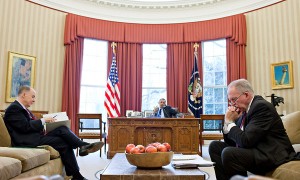White House Attempts Again To Do In Secret What Requires Transparency, Law
For the last year, the Administration has been grasping at ways to give its drone program the semblance of legal and moral justification. It started a year ago with a debate in the Situation Room over how to provide transparency on the drone program without hurting the Administration’s legal stance refusing transparency.
The calls for transparency in discussing the Awlaki strike were batted away at first. But behind the scenes, several prominent lawyers in the national-security bureaucracy began lobbying their colleagues and superiors for some degree of disclosure. Among them were Jeh C. Johnson, the Defense Department general counsel, and Harold Hongju Koh, the State Department legal adviser. The national-security “principals” quickly divided into camps. The CIA and other elements of the intelligence community were opposed to any disclosures that could lift the veil of secrecy from a covert program. Others, notably the Justice and State departments, argued that the killing of an American citizen without trial, while justified in rare cases, was so extraordinary it demanded a higher level of public explanation.
[snip]
The issue came to a head at a Situation Room meeting in November. At lower-level interagency meetings, Obama officials had already begun moving toward a compromise. [snip]
Another senior official expressing caution about the plan was Kathryn Ruemmler, the White House counsel. She cautioned that the disclosures could weaken the government’s stance in pending litigation.
[snip]
It came down to what Denis McDonough, the deputy national-security adviser, cheekily called the “half Monty” versus the “full Monty,” after the British movie about a male striptease act. In the end, the principals settled on the half Monty. As the State Department’s Koh continued to push for the maximum amount of disclosure, McDonough began referring to that position as “the full Harold.”
It continued through a series of high level speeches early this year. The centerpiece of that series featured the Attorney General celebrating our values, the Constitution, and rule of law, then noting the importance of judicial oversight (though in the case of surveillance, not killing), but finally rejecting all those things when it comes to killing American citizens.
But just as surely as we are a nation at war, we also are a nation of laws and values. Even when under attack, our actions must always be grounded on the bedrock of the Constitution – and must always be consistent with statutes, court precedent, the rule of law and our founding ideals. Not only is this the right thing to do – history has shown that it is also the most effective approach we can take in combating those who seek to do us harm.
[snip]
We must – and will continue to – use the intelligence-gathering capabilities that Congress has provided to collect information that can save and protect American lives. At the same time, these tools must be subject to appropriate checks and balances – including oversight by Congress and the courts, as well as within the Executive Branch – to protect the privacy and civil rights of innocent individuals.
[snip]
Any decision to use lethal force against a United States citizen – even one intent on murdering Americans and who has become an operational leader of al-Qaeda in a foreign land – is among the gravest that government leaders can face. The American people can be – and deserve to be – assured that actions taken in their defense are consistent with their values and their laws. So, although I cannot discuss or confirm any particular program or operation, I believe it is important to explain these legal principles publicly.
[snip]
Some have argued that the President is required to get permission from a federal court before taking action against a United States citizen who is a senior operational leader of al Qaeda or associated forces. This is simply not accurate. “Due process” and “judicial process” are not one and the same, particularly when it comes to national security. The Constitution guarantees due process, not judicial process. [my emphasis]
These themes appeared again in an Obama interview with CNN in September. The President insisted that the best way to reduce the terrorist threat is to live up to our values.
Our most powerful tool over the long term to reduce the terrorist threat is to live up to our values and to be able to shape public opinion not just here but around the world that senseless violence is not a way to resolve political differences. And so it’s very important for the President and for the entire culture of our national security team to continually ask tough questions about, are we doing the right thing? Are we abiding by rule of law? Are we abiding by due process? And then set up structures and institutional checks so that you avoid any kind of slippery slope into a place where we’re not being true to who we are. [my emphasis]
As I noted at that time, Obama’s Administration has rejected the best tool for ensuring we live by our laws and values: court review.
Having started by saying that drones are just a tool, he ends up by saying that we will vanquish terrorism by upholding our values–rule of law and due process.
And then the Constitution Professor President describes “set[ting] up structures and institutional checks” to make sure that we deliver rule of law and due process.
This, from the guy whose Administration refused to litigate a suit from Anwar al-Awlaki’s father to make sure it was upholding the standards Obama claimed in this interview in Awlaki’s case.
This, from the guy whose Administration has claimed state secrets to make sure no court can review the claims of people who have been rendered or tortured or illegally wiretapped.
This, from the guy who wouldn’t do the politically difficult things to have Khalid Sheikh Mohammed tried–and surely, convicted–before a civilian court in NYC.
He’s looking for structures and institutional checks to make sure we don’t go down that slippery slope where we forget rule of law. And yet his Administration has repeatedly avoided the one mandated by the Constitution: courts.
In October we learned that the Administration had charged the Moral Rectitude Assassination Czar to set up structures to make sure the program didn’t go haywire if Obama’s assassination czars were replaced by Mitt’s.
That effort continues, Scott Shane reports today, though with slightly less urgency now that we know John Brennan (or his replacement) will be targeting the drones rather than Cofer Black.


